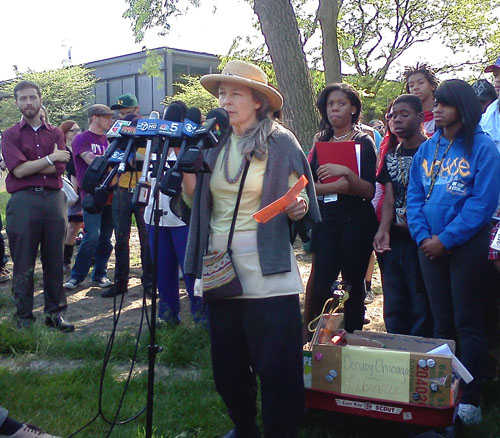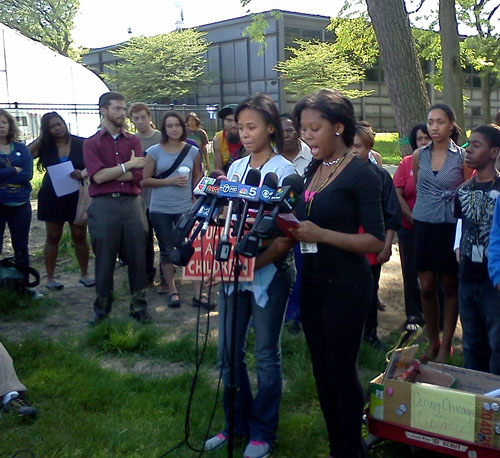Dyett High School protests its 'phase out' with a celebration of student art
Dyett High School became widely known earlier this year as one the 17 schools that the Board of Education closed, 'phased out', or subjected to what it called "turnaround". Despite massive community protests and detailed evidence that Dyett had been sabotaged by Chicago Public Schools officials for years, on February 22, 2012, the Board of Education voted to "phase out" the school, located at 555 E. 51st St., in Chicago's Washington Park, on the city's South Side.
 As part of the celebration of Dyett High School on May 14, 2012, Art teacher Jan Favia tells reporters how she built an arts program at Dyett High School with support from the school and the community over the past four years, but was let go earlier this year, one month before she was due to attain tenure. She has now returned to Dyett and is again teaching art — but as a day-to-day substitute teacher, at a small fraction of her prior salary. Substance photo by David R. Stone.Dyett should have been famous for its successes against the odds. Instead it was treated to the slanders that accompanied the attacks on all the schools slated for closing. By the time the Board voted on February 22, protests against the phase out of Dyett had been among the most intense of the winter of 2012. One of Dyett's successes was a highly creative art program. That was the message of combination of celebration, protest, and news conference held outside the South Side school on the afternoon of Monday, May 14, 2012.
As part of the celebration of Dyett High School on May 14, 2012, Art teacher Jan Favia tells reporters how she built an arts program at Dyett High School with support from the school and the community over the past four years, but was let go earlier this year, one month before she was due to attain tenure. She has now returned to Dyett and is again teaching art — but as a day-to-day substitute teacher, at a small fraction of her prior salary. Substance photo by David R. Stone.Dyett should have been famous for its successes against the odds. Instead it was treated to the slanders that accompanied the attacks on all the schools slated for closing. By the time the Board voted on February 22, protests against the phase out of Dyett had been among the most intense of the winter of 2012. One of Dyett's successes was a highly creative art program. That was the message of combination of celebration, protest, and news conference held outside the South Side school on the afternoon of Monday, May 14, 2012.
Dyett students, faculty and staff — with support from the Chicago Teachers Union, members of the Chicago “Occupy” movement, and community groups such as the Kenwood-Oakland Community Organization (KOCO) — drew reporters and camera crews from Chicago's corporate media and Substance to see student artwork and hear how the school continues to fight for its survival.
Students read a letter they sent to U.S. Secretary of Education Arne Duncan, calling on him to investigate the Board of Education's actions against Dyett as a violation of Title VI of the Civil Rights Act. Like nearly all of the schools closed by Board action, Dyett serves an economically impoverished African-American student population. The speakers at the news conference detailed how the Board has starved Dyett of resources for years.
 Dyett High School students Diamond McCullough and Aquilla Griffen (speaking at the array of microphones from many of Chicago’s broadcast media) are fighting back after the Board of Education rejected a school improvement plan developed by the school and the Kenwood-Oakland Community Organization. Griffen read aloud the text of a letter she sent to U.S. Secretary of Education Arne Duncan. Her letter accused the Board of Ed of violating Title VI of the Civil Rights Act. Her letter said the Board had “already sentenced Dyett to a slow death” over the past few years when it eliminated programs and cut funding for the neighborhood school that serves an impoverished minority community on Chicago’s South Side. Substance photo by David R. StoneThe "phase out" of Dyett means that Dyett's students will have to go to Phillips High School, more than two miles away. Phillips, which is currently under a "turnaround" managed by the Academy for Urban School Leadership (AUSL), presents numerous challenges to the Dyett students, as community leaders have warned.
Dyett High School students Diamond McCullough and Aquilla Griffen (speaking at the array of microphones from many of Chicago’s broadcast media) are fighting back after the Board of Education rejected a school improvement plan developed by the school and the Kenwood-Oakland Community Organization. Griffen read aloud the text of a letter she sent to U.S. Secretary of Education Arne Duncan. Her letter accused the Board of Ed of violating Title VI of the Civil Rights Act. Her letter said the Board had “already sentenced Dyett to a slow death” over the past few years when it eliminated programs and cut funding for the neighborhood school that serves an impoverished minority community on Chicago’s South Side. Substance photo by David R. StoneThe "phase out" of Dyett means that Dyett's students will have to go to Phillips High School, more than two miles away. Phillips, which is currently under a "turnaround" managed by the Academy for Urban School Leadership (AUSL), presents numerous challenges to the Dyett students, as community leaders have warned.
Below is the text of a news release from the Chicago Teachers Union announcing the action at Dyett:
Dyett High School Celebrates the Arts, despite not having them (Chicago 5/14)
On Monday, May 14th starting at 3:00 pm, artists, teachers, community members and students will gather together and create art at Dyett High School, on the south-side of Chicago. There will be multiple art stations for students to participate in after dismissal. Local artists will share their knowledge with students about how to create comic books, build drums, paint banners, design posters, silk-screen t-shirts, and more. The art fair was precipitated by the growing concerns of Chicagoans at the lack of essential supports and programming for neighborhood Chicago Public Schools.
In fact, since 2011, Dyett High School students have been denied an art program by the Chicago Public Schools. Adding insult to injury, this past February the Chicago Board of Education unanimously decided to close the school despite a history of neglect and sabotage by the school district.
During the school closings battle earlier this year, the district’s Chief Operating Officer, Tim Cawley, acknowledged the tendency of CPS to close schools after years of divestment;
"If we think there is a chance that a building is going to close in the next five to 10 years, if we think its unlikely it’s going to continue to be a school, we are not going to invest."
“Now the district is reducing their facilities budget by 85% for next year, they are going to do to other schools what they’ve already done to Dyett,” said June Webb, a science teacher at Dyett. "Parents and teachers alike are outraged that CPS has the audacity to close our schools after they have failed to provide art, music, world languages and the appropriate numbers of support staff to make our schools successful. It’s important to defend our schools. My union, the Chicago Teachers Union, has spoken out repeatedly about the need for more enrichment, adequate staffing and appropriate facilities for our schools; it’s about time that CPS started listening.”


By: Theresa D. Daniels
The Closing of Dyett HS After CPS Neglect
It was a wonderful irony to have this after-school art program be part of the demonstration against the closing of Dyett HS when Dyett had had no art program. How wonderful for the students to get this bit of art, anyway. Good article highlighting the kind of neglect schools get for years before they are low-rated by CPS, then closed.